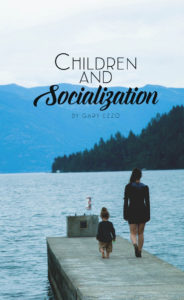 There is a utopian theory suggesting mankind can engineer the perfect socialized child and that scary thought usually has a preschool component attached to it. The very nature of children wars against the notion that a formalized preschool experience can gain a child a social advantage that he otherwise could not have obtained. We believe any discussion about socialization must start with the nature of children, specifically, the nature of toddlers. Toddlers are too ego-centric to be placed in an environment filled with other ego-centric children. As we use the term here, ‘ego-centric’ is not negative but descriptive of when you put ten toddlers in a room, whose intrinsic world-view is centered on “me, myself and I” you cannot expect them to emerge with a healthy sense of others. Their tiny worldviews of the preciousness of ‘others’ cannot be manipulated nor mature faster than the course of nature allows and there have been enough studies done that concur with this point of view.
There is a utopian theory suggesting mankind can engineer the perfect socialized child and that scary thought usually has a preschool component attached to it. The very nature of children wars against the notion that a formalized preschool experience can gain a child a social advantage that he otherwise could not have obtained. We believe any discussion about socialization must start with the nature of children, specifically, the nature of toddlers. Toddlers are too ego-centric to be placed in an environment filled with other ego-centric children. As we use the term here, ‘ego-centric’ is not negative but descriptive of when you put ten toddlers in a room, whose intrinsic world-view is centered on “me, myself and I” you cannot expect them to emerge with a healthy sense of others. Their tiny worldviews of the preciousness of ‘others’ cannot be manipulated nor mature faster than the course of nature allows and there have been enough studies done that concur with this point of view.
We believe pushing a child into early-formalized socialization works against the child’s developmental age, abilities and interest. Toddlers, right up through their third birthday engage in self-play not cooperative play. Their inclination is to self-focus to the point of turning their backs to the other children and playing by themselves. Socialized play, where there is give-and-take within an activity usually begins around the age of three, rarely before.
In addition, toddlers placed in organized preschool are often negatively impacted by the peer pressure associated with children from homes that do not share the same values as you do. That is because toddlers tend to imitate negative behaviors such as bullying, physical aggression, pushing and taking toys from others more easily than they internalize virtuous conduct such as sharing, cooperating and being kind, which are practically non-existent in their peer group. This happens regardless of the wonderful efforts of the teacher.
We have shared before about sending right and wrong messages as it relates to emotions needing reciprocal responses. Toddlers lack the ability to empathize and thus cannot provide the reciprocal affirmation needed. They simply cannot turn off their sense of “me, myself and I” and become other-oriented. This is why over-socialization causes children to become too reliant on receiving approval and affirmation from a peer group, rather than from the steady and unchallenged source they find in their own home.
Parents hoping to give their children an educational advantage must realize that research is fairly consistent when it comes to academic gains. If there are any advantages gained from pushing children into preschool modules, they have a very limited shelf life. When you compare the temporary advantage gained with the offset in emotional and social set-back, you have to ask if sending your child to preschool is best when other options are available.
A better alternative to a formalized preschool setting is scheduling playtimes with other toddlers in your home, or your child in the home of others who come from families of likeminded persuasion. One playmate once or twice a week is plenty for the first couple of years of life. Children fair better socially when they experience pleasant contacts with other children (even on a limited basis), than children in preschool settings where peer socialization is not always pleasant. The belief that a preschool experience can help a child become better adjusted through early group socialization speaks to the power of advertising more than it does to sound principles of social development.
Finally, if you ask any college student if they believe pre-school or any of the myriad of activities they were involved in as a toddler advanced them in any way, you will likely hear that they can’t even remember them. Too much socialization at these tender ages can and will often burn a child out physically, emotionally and possibly neurologically. Your children do not have to be involved in everything! Simplify your life.
This article used with permission from Growing Families International. You can see more articles at www.growingfamiliesusa.com.




Leave a Reply